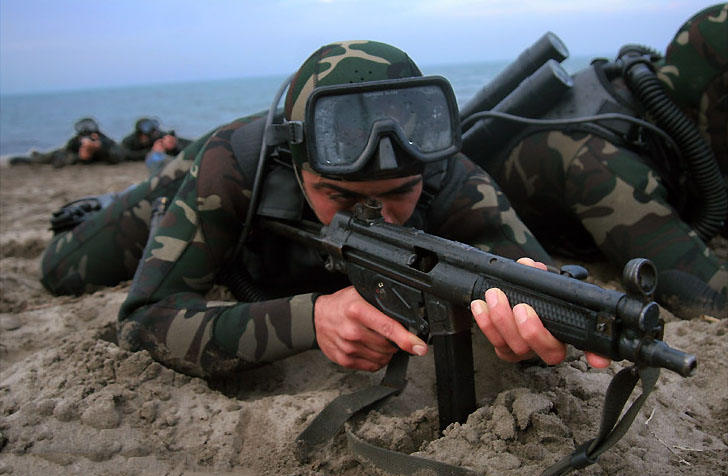Iran’s IRGC – A terrorist organization?
April 9, 2019 | Expert Insights

The US intends to designate Iran’s Islamic Revolutionary Guard Corps (IRGC) as a foreign terrorist organization - a move that has been condemned by Tehran.
Background
Iran's most powerful security organisation, the Islamic Revolutionary Guard Corps was set up to protect the country's clerical ruling system after its 1979 Islamic Revolution, which toppled the Western-allied secular monarch Shah Mohammad Reza Pahlavi. IRGC is in charge of Iran's ballistic missiles and nuclear programmes, and answers directly to Supreme Leader Ayatollah Ali Khamenei. It is estimated to have 125,000 personnel, comprising of army, navy and air units.
The IRGC became heavily involved in reconstruction and has expanded its economic interests to include a vast network of businesses, ranging from oil and gas projects to construction and telecommunication. The US has reimposed sanctions on Iran after withdrawing last year from the 2015 nuclear deal, in order to pressure Iran to abandon its nuclear program.
Analysis
The Trump administration is expected to designate Iran's Islamic Revolutionary Guard Corps (IRGC) as a foreign terrorist organization. This decision, formally made under the State Department's purview, is taking on heightened importance as part of the White House's increasingly aggressive strategy towards Iran. It will mark the first time the US has designated a branch of the armed forces of a foreign government, as a terrorist group.
Officials informed of the step said an announcement was expected after months-long escalation in the administration’s rhetoric against Iran, its support for militia groups in Syria, Lebanon, Iraq and Yemen, as well as anti-Israel groups in the region and beyond.
“It is hard to imagine a bigger sanctions stick than that,” said Richard Nephew, a former principal deputy coordinator for sanctions policy at the state department, and the author of The Art of Sanctions. “It is a sign the US is prepared to fully escalate ‘maximum pressure’ but what is lacking is a clear endgame. There is a confusion of means and ends. The administration sees the damage inflicted as success. But that’s not how it works” said Ariane Tabatabai, an Iran expert at the Rand Corporation.
Defence officials have said that US troops in Syria and Iraq often find themselves operating in close proximity to members of the IRGC. "Under the cover of the Syrian war, the IRGC is now trying to plant military roots in Syria and establish a new strategic base to threaten Syria's neighbors such as Israel," Brian Hook, the State Department's special representative for Iran.
IRGC Chief Commander Major General Mohammad Ali Jafari said that in case the U.S. takes such a step, its forces in western Asia “will lose peace and quiet”. “If the U.S. takes this step and endangers our national security we will take reciprocal measures, based on the policies of the Islamic Republic,” Jafari said. Although Jafari has not said what sort of threat the U.S. military will face, one option that Iran has is to target American forces based in Iraq. Aside from Iraq, where some 5,200 American troops are stationed; and Syria, where some U.S. 2,000 troops remain, the U.S. 5th Fleet, which operates in the Persian Gulf from its base in Bahrain, and the Al Udeid Air Base in Qatar, are also potentially at risk.
The Guards' prized unit is the Quds Force supports forces allied with Iran around the region - including Syrian President Bashar al-Assad. In Lebanon, the designation could further restrict U.S. officials on who they can interact with. The Guard has close ties to Hezbollah, which is part of the Lebanese government. The Hezbollah is already designated a foreign terrorist organization by the U.S. Its presence in Lebanon’s parliament and the executive branch have forced the U.S. to avoid any contact with Hezbollah members even as the U.S. continues to provide assistance to, and works with the Lebanese army.
Assessment
Our assessment is that IRGC is a state actor. The Iranian cabinet is composed of former IRGC officers while several others have been appointed to provincial governorships. It can be noted that the IRGC affiliates control an array of commercial enterprises, including large mines, primary industries (including downstream oil and gas), foreign commerce, banks, insurance, power industries, postal networks, roads, railroads, airlines, and shipping. Designating IRGC as a terrorist organization will isolate it and deter donations which is an added strain to the already sanctioned economy of Iran.
Also, Iraqi Shiite militias close to the IRGC are essentially the hosts and protectors of the 5,000 U.S. troops in Iraq. We feel that this escalation will mean US troops and diplomats could be barred from contact with Iraqi or Lebanese authorities who interact with Guard officials or surrogates.
Read more:








Comments